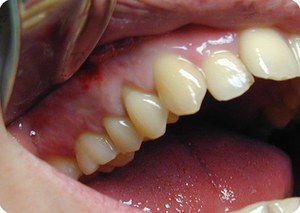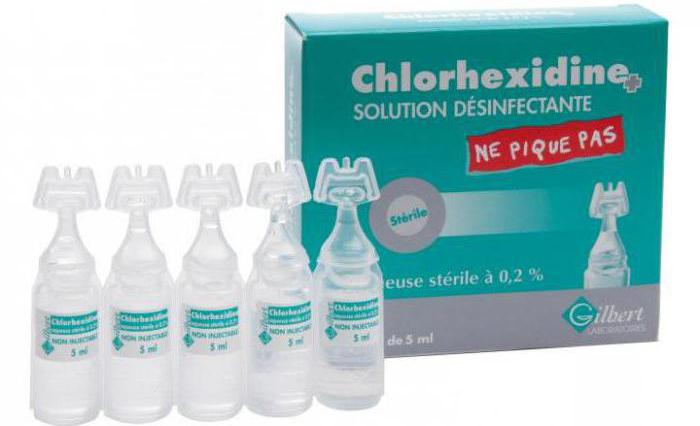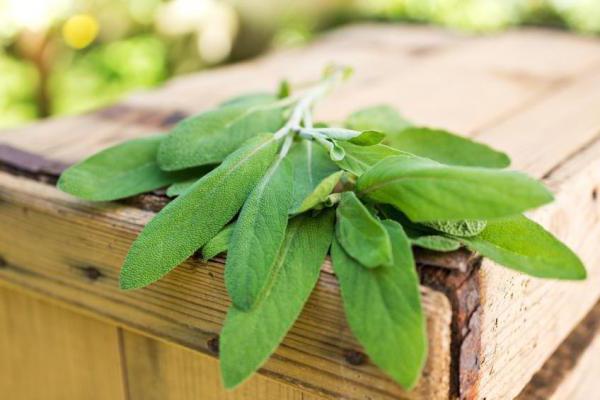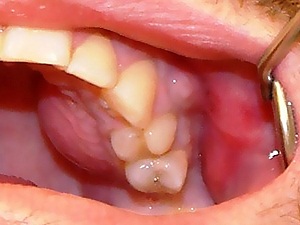Or exacerbation of periodontitis. With such swelling, the pain is not pulsating, but constant, not severe, and does not depend on biting. With gingivitis and periodontitis, the gums not only swell, but also bleed.
If your gums are swollen due to gingivitis or worsened periodontitis, this can lead to further mobility and loss of teeth, aggravation of inflammatory process, the appearance purulent discharge. The most serious consequences is the development of chronic periodontitis and, as a result, tooth loss. If you don't start timely treatment, then the swelling can only intensify, spread to the entire jaw, inflammation can even spread to the jaw bone. Therefore, as soon as you notice swelling, you should immediately contact your dentist and begin treatment.
If the gums are swollen about 1-2 centimeters from the neck of the tooth and the swelling is quite extensive (up to 3 centimeters in diameter), and you are bothered by throbbing pain, and when you bite on the tooth the pain intensifies, then this is most likely gumboil or abscess. However, patients often experience general increase body temperature up to 37.2-37.8°C. Since these diseases are quite dangerous, you should immediately visit the dentist to understand the causes and, if the diagnosis of “abscess” is confirmed, open it and remove the pus accumulated in the gum.
Treatment
If the cause is gingivitis, then in order to relieve swelling, you must first eliminate the causes of inflammation. A dental tartar removal procedure may be necessary, as well as professional cleaning teeth from plaque. Treatment of swelling with gingivitis usually includes anti-inflammatory therapy, as well as therapeutic applications to the gums with drugs such as "Metrogil-denta", "Solcoseryl" and others. During the treatment period, the dentist may also recommend the use of special medicated toothpastes intended for inflamed gums. Rinsing the mouth with decoctions of medicinal herbs will not hurt either - daisies, calendula, yarrow.
If the cause is gumboil, then, first of all, it is necessary to eliminate the causes of inflammation. For staging correct diagnosis the dentist will definitely prescribe X-ray examination. Only if present can a diagnosis of “flux” be made. If the swelling is small and treatment is started at an early stage of the disease, then you can do without therapeutic treatment, without removing the diseased tooth.
With the help special drugs The dentist will be able to quickly eliminate the inflammatory process. If the swelling of the gums is large, the patient consulted a doctor untimely, then the dentist may advise resection of the apex of the tooth root, which will simultaneously cure the swelling and save the tooth.
In any case, after treatment, the dentist will definitely advise you on how to relieve swelling of the gums at home. To do this, you can use both rinsing the mouth with ready-made “pharmacy” disinfectant rinsing solutions, and self-prepared decoctions from medicinal herbs, which have anti-inflammatory and anti-edematous effects.
Sometimes, even when problems arise with our teeth, we try to put off visiting the doctor, fearing pain, discomfort, and even the dental office itself, and what can we say about the gums...
Many people do not consider gum disease to be something serious at all, hoping that everything will resolve on its own, but swelling of the gums if left untreated can cause serious consequences.
Why the gum near the tooth is swollen: reasons and what to do
There are many factors that cause gum swelling, so to carry out the correct and effective treatment necessary find out the exact reason the problem that has arisen.
Based on the type of source, there are two types of swelling: general and localized, each of which has its own causes.
If swelling is caused by improper oral hygiene procedures, it is necessary to change the instruments used and/or select the appropriate toothpaste. Often, hard toothbrushes and irritating chemical components included in cleaning products and mouthwashes become the cause of gum injury. As a result of their use, general swelling is observed, which can also indicate the presence of allergic reactions in the body.
In addition, gum injuries can be caused by mechanical stress on the affected area. For example, it's wrong installed prosthesis or a filling, as well as a chipped tooth, can injure the gums, resulting in swelling.
In addition, the seal (even if it is installed according to all the rules) can provoke an allergic reaction, which also needs to be taken into account.
There are situations when the gums swell after the removal of a diseased tooth. This happens in the following cases:
- The body's natural reaction to tissue damage (passes in 2-3 days).
- Infection of the gums due to the patient’s failure to comply with oral hygiene rules in the postoperative period or due to insufficient treatment medical instruments in a dental clinic.
 A tumor coupled with bleeding indicates the development of gingivitis. Patients note pain in the inflamed areas and try to avoid exposure to them. Soreness and local swelling may be a sign of development flux or presence of a cyst.
A tumor coupled with bleeding indicates the development of gingivitis. Patients note pain in the inflamed areas and try to avoid exposure to them. Soreness and local swelling may be a sign of development flux or presence of a cyst.
General edema can be caused by the development of a pathology such as scurvy, which occurs due to acute shortage vitamin C. In this case, you should consult your physician to determine the appropriate diet.
Teething (including wisdom teeth) can also cause swelling. In this case (in the absence of other unpleasant sensations) there is no need to show excessive concern, just maintain hygiene oral cavity and minimize any impact on the inflamed gum.
However, swelling near an erupting wisdom tooth, accompanied by pain and discomfort, should be a reason to contact a dental clinic.
Swelling may also be caused abscess or exacerbation of periodontitis. According to statistics, about 90% of cases of visiting the dentist about swollen gums are caused by these reasons.
The appearance of a gum tumor may be preceded by pain syndrome in the tooth, but in some cases there may be no pain. In addition, the diseased tooth can be slightly mobile, and any touching or biting on it causes increased pain.
What to do if your gums are swollen?
Treatment of the swollen area is carried out in accordance with the detected cause of the swelling. If the tumor occurs against the background of periodontitis or gingivitis, first of all, the inflammatory process itself is stopped, after which the tooth is treated.
Treatment pathological processes in the gums consists of carrying out a series of dental procedures(tartar cleaning, etc.), as well as antibacterial and anti-inflammatory therapy.
Under no circumstances should you warm up swollen gums! This can cause further spread of the tumor to the facial bone. In addition, there is a huge risk of purulent processes, which makes treatment much more difficult.
Treatment of swollen gums around a tooth
If the cause is the development of pathological processes in the oral cavity, what will the dentist do in this case?
First of all, he will conduct necessary procedures, which will save you from the problem that has arisen. It could be tooth filling(if the inflammatory process develops inside root canal), followed by thorough cleaning and treatment antibacterial drugs, then a new filling is installed. In particularly difficult cases, surgery is performed to remove the diseased tooth.
What to do if you have gum disease: first aid
At home, it is quite difficult to determine what exactly needs to be done to stop the inflammatory process. But most people faced with this problem prefer to do without the help of a dentist (provided that nothing else is bothering them).
To avoid more serious consequences, you should not resort to radical methods of self-medication.
To prevent the spread of the inflammatory process, it is recommended to use infusions that have an antibacterial effect. Among the highly effective products sold in pharmacies without a prescription are: Givalex, Mevalex, Stomatilin. These medications should be used according to the instructions included in the package.
To alleviate the patient's condition, it is allowed to use special antiseptic drugs, which can be prepared independently or purchased at a pharmacy.
The following medications can be used for home treatment:
- Tsifran;
- lincomycin;
- chlorhexine;
- cephalexin.
Folk remedies
How to treat swollen gums folk ways? There is no definite answer to this question, since at home it is only possible slowing or stopping development pathological process. Many will not agree with this, claiming that they completely got rid of the problem on their own, without resorting to the help of a specialist. However, this is premature joy, since it is possible that the pathology has not gone away, but has simply flown into a latent phase with a smooth transition to a chronic form.
But there are times when an illness overtakes a person at the wrong time, when visiting the dentist is impossible, but you need to help yourself somehow. And this is where funds come to the rescue traditional medicine.
So, if swelling of the gums is not accompanied by toothache, you should first consider the question about oral hygiene, since the cause of the development of the inflammatory process can be harmful microorganisms. Disinfection of the oral cavity can be carried out using medicinal plants, such as sage, chamomile, St. John's wort, calendula, etc. Aloe has an excellent anti-inflammatory effect.
Among the main benefits of medicinal herbs are the following:
There are many folk recipes for the treatment of swollen gums.
Calendula rinse. Dilute the alcohol tincture of calendula with water in a ratio of 1:10. Rinse your mouth 2-3 times a day.
Vegetable oils. Sore gums (or inner surface cheeks) can be lubricated fir oil or soak a bandage (cotton wool) in it and apply it to the swollen gum for 15 minutes. Wipe your gums with heated olive oil using a soft toothbrush. If, in addition to swelling, there is pain in the gums, you can rinse your mouth with the same oil. Repeat treatment daily after sleep. The duration of the procedure is 10 minutes.
Cabbage pickle. If you experience loose gums, you need to rinse your mouth with sauerkraut brine.
Aloe. The juice of this plant is an excellent anti-inflammatory agent. It is necessary to wipe the gums with the pulp of an aloe leaf 3 times a day.
Melissa infusion. Pour boiling water (1 tbsp) over lemon balm herb (2 tablespoons) and leave for 4 hours. Strain the infusion and rinse the inflamed gums.
Propolis and apple cider vinegar . Dilute vinegar with water in a ratio of 1:5, rinse the gums. Then take propolis tincture (40%) and keep it in the mouth for some time.
Lemon oil. Grate or finely chop fresh lemon peels and pour vegetable oil(any) and leave in a dark container for 3 days, then simmer in a water bath. Apply the resulting oil to the inflamed gums.
Lemon juice. In case of loosening of the gums and the appearance of ulcers on them, it is recommended to treat problem areas with lemon juice diluted with water. The procedure is carried out using a soft brush or cotton wool wrapped around a stick. Lubricate only the gums, without touching the teeth.
Hydrogen peroxide and propolis. Dilute hydrogen peroxide (3%) with water in a 1:1 ratio and rinse the mouth with the resulting solution. Dry problem gums with warm air and lubricate them alcohol tincture propolis (40%), previously diluted with water (to avoid burns), dry again. Repeat the procedure daily for 10 days.
Honey and salt. Sea or table salt dissolve in a small amount of honey. Rub the resulting mixture into your gums using soft brush or fingers, performing simultaneous tissue massage.
St. John's wort. Pour the St. John's wort herb with vodka (1:5) and leave. Dilute the tincture with water at the rate of 30 drops per 1/2 cup and rinse the mouth with the resulting solution. You can also prepare an infusion of St. John's wort herb (1 tbsp) and boiling water (1 tbsp), after completely cooling, strain. Use to rinse the mouth. St. John's wort has an anti-inflammatory and astringent effect.
Celandine. Mix refined olive oil and celandine tincture (30%) in a 1:1 ratio. Apply the resulting emulsion to swollen gums 1-2 times a day.
Rose. Infuse rose flowers with vodka. Use the resulting tincture to rinse inflamed and swollen gums.
Plantain. Fresh leaves Rinse the plants thoroughly and pass through a meat grinder. Squeeze the juice out of the resulting pulp and lubricate your gums with it.
Elderberry infusion. If there is pain, itching and swelling of the gums (occurs with gingivitis), you can use a hot infusion of Siberian or red elderberry to rinse the mouth. In addition, you need to go to a dental clinic to remove tartar.
All of the above traditional medicine recipes can be used in combination with medications for the treatment of teeth and gums, and as maintenance therapy after undergoing primary treatment.
Now you know why your gums swell and what to do in such cases. In general, inflammation is easier to prevent than to treat. Therefore, maintain oral hygiene, try to balance your diet as much as possible, including all the necessary vitamins and microelements, and visit the dentist at least once every 6-7 months for preventive purposes. And then your teeth and gums will always be healthy and beautiful.
What dentists call with clever words periodontitis and gingivitis, in simple words can be called inflammation of the gums. Visiting the dentist does not bring much joy, but you should not neglect illnesses, as this can lead to complications. What to do at home if your gums are swollen and painful? Let's look at the answer to this and other questions in more detail.
Why gums swell - the main reasons
- The most trivial reasons The inflammatory process that affects the gums can be caused by non-compliance with personal hygiene rules. As you know, leftover food causes the proliferation of pathogenic microbes. Therefore, observing simple measures Cleansing your mouth can keep your teeth and gums healthy.
- Mechanical trauma to the gums, tooth extraction, leads to swelling, inflammation, redness and pain.
- Teething in children is often associated with pain and swelling of the gums. Adults may face the same problem when their wisdom teeth erupt.
- Tooth decay, bleeding gums, stomatitis - these diseases cause inflammation in the mouth of various nature.
- Poor quality dentures hard tooth brushing can cause injury to the gums and cause unpleasant consequences.
- Vitamin deficiency and weakened immunity destroy health from the inside. A lack of vitamin C in the body can cause bleeding gums. Vitamin C does not accumulate in the body; it must be consumed regularly with food.
The gums are swollen and painful - the main symptoms
The reasons that accompany pain in the gums are very unpleasant - redness, swelling, and sometimes the gums can bleed. Comes from the oral cavity bad smell, the tongue may be coated with a yellow or white coating. Chewing food causes pain.
The inflammatory process, which subsequently causes the gums to swell and hurt, begins unnoticed. When brushing your teeth, you may notice bleeding. Few people pay attention to this symptom, so the process becomes chronic.
Healthy gums fit tightly to the teeth; inflamed gums, on the contrary, peel off from the dentition. The space that forms between the gum and tooth becomes a “home” for pathogens. If you don't do it in time necessary measures, then this may lead to serious consequences up to tooth loss.
Preventing gum inflammation
It is necessary to maintain regular oral hygiene. All accessories used for cleaning the mouth - toothbrush, paste, irrigator, dental floss must be kept clean and used for its intended purpose. The brush must be changed regularly.
Qualitatively selected toothpaste, which contains medicinal plants and necessary components, will help eliminate bleeding, strengthen tooth enamel.
Visiting the dentist once every six months is very good habit. The doctor will give necessary advice, will eliminate diseases on early stages development.
Refusal to consume foods that damage gums and tooth enamel will serve as an excellent prevention of the occurrence of dental diseases. Limited use lollipops and crackers, which scratch the gums and cause minor injuries, will help maintain dental health.
After brushing your teeth, massage your gums. The procedure strengthens periodontal tissue, relieves swelling, and stimulates blood circulation. Massage can be done using your fingers or a toothbrush.
1 tsp. honey, 1 tsp. olive oil, a pinch of sea salt. This mixture strengthens the gums, removes plaque and tartar, and serves as an antibacterial agent. After basic brushing of your teeth, dip your brush into this mixture and brush them again with this product. Then rinse your mouth thoroughly.
Rinsing your mouth after eating food is helpful.
Constantly eating cooked food can harm your gums and teeth. As exercise equipment that strengthens gums and teeth, you need to eat apples, carrots and other hard vegetables and fruits. The chewing muscles are strengthened and blood circulation improves.
It is important to enrich your diet with vitamin C and calcium. Ascorbic acid strengthens blood vessels, their walls become more elastic and less prone to damage. Sufficient quantity essential vitamins and microelements will not only strengthen immune system, but they will positive influence for the whole body. Ascorbic acid and calcium are found in lemon, sauerkraut, green currants, cottage cheese.
What to do for swollen gums at home

Perhaps the best thing we can do at home for swelling and pain in the gums is to rinse our mouths with solutions of medicinal herbs and other available remedies. Below are several traditional medicine recipes that it is advisable to use as soon as you feel pain and notice inflammation. It is recommended to use not one product, but several - for example, rinse your mouth with one recipe on the first day, and another on the next day.
How to rinse swollen gums to relieve inflammation
- Gargling with calendula infusion
For 200 milliliters of water you need to take 1 tbsp. l. plants. Infuse the broth brought to a boil and cool, rinse the mouth with warm broth three times a day, after meals.
- Rinsing your mouth with a solution of baking soda and salt
In a glass of water, dissolve a teaspoon of salt and a teaspoon baking soda, the water should be warm. Rinsing with the solution relieves inflammation, swelling and redness.
- Gargling with sauerkraut juice
This method is good because, thanks to the salt in the juice, the oral cavity is disinfected. Vitamin C, which is sufficient in the product, strengthens blood vessels and relieves inflammation. You can rinse your mouth up to five times a day.
- Apple cider vinegar
Apple cider vinegar diluted with water 1:5 relieves inflammation and soothes pain. After rinsing, the swollen gums can be lubricated with honey.
- Infusion of celandine
Dilute 40 drops alcohol infusion celandine in a glass warm water, rinse your mouth three times a day after eating food.
- St. John's wort and lemon balm
Prepare medicinal plants in a water bath. Place St. John's wort and lemon balm in equal parts in an enamel bowl, pour a glass of boiling water and bring to a boil. Place the decoction on water bath, add another glass of boiling water and simmer for 5 minutes. Rinse with this decoction three times a day.
- Oak bark
Oak bark is an excellent astringent and anti-inflammatory agent, which is recommended for rinsing swollen gums near a tooth. It is better to prepare the decoction for rinsing in advance. Brew 200 grams of oak bark with a glass of boiling water. Rinse your mouth with the strained broth several times a day.
Rinsing gums with a mixture of juices and sea salt, has a positive effect on the inflammatory process. Mix cucumber, apple, and carrot juice in equal parts, add 1 teaspoon of salt to a glass of juice. Rinsing should be done three times a day.

- Aloe juice
Squeeze the juice from one aloe leaf, moisten a cotton pad and apply to the swollen gum several times a day.
- Medicinal plant plantain
Grind several leaves of the plant into a paste. Mix the pulp with honey, wrap it in a gauze bag and apply to the swollen gum.
- Nettle decoction
Brew three tablespoons of nettle with a glass of boiling water. Leave the decoction for three hours. Rinse your mouth several times a day. Nettle has a hemostatic and anti-inflammatory effect.
- Decoction of sage and chamomile
Brew 1 teaspoon of chamomile and sage with a glass of boiling water. Leave for 4 hours, wrapped in a towel. Rinse your mouth with the prepared broth up to five times a day. Chamomile and sage have a gentle effect on sore gums, relieving inflammation.
- Ginger juice
Grate one ginger root on a fine grater and squeeze out the juice. Dilute the juice with a glass of warm water and add a teaspoon of honey. Rinsing the mouth with ginger juice removes inflammation and stimulates blood flow to the gums.
Causes a lot of trouble for a person. The resulting pain prevents chewing normally, and after some time the pathological process leads to disruption of facial contours and diction. All this can be accompanied by many unpleasant symptoms. And what if your gums are swollen? What to do in this case? Let's try to figure this out.
Reasons
An inflammatory process in the gums can occur due to various reasons. Below are the most basic ones.
A pathological process in the oral cavity can occur due to improper dental care. If used too hard brush, during cleaning there is strong pressure on the gums, which injures the tissue. Frequent use Whitening pastes also lead to damage to the mucous membrane and its swelling.
The body may lack vitamins, especially C. This can lead to unpleasant disease like scurvy. The gums begin to turn pale, then turn blue, and bleeding appears. After some time, a secondary infection may occur, which contributes to the formation of ulcers in the oral cavity.
Gingivitis is the most common reason development of pathology. Such as plaque and tartar, lead to redness of the gum mucosa, swelling, itching and bleeding.
If the gums are swollen and the cause may lie in advanced pulpitis or caries. They lead to the fact that cariogenic microorganisms begin to move deeper into the dental cavity, affecting the pulp. In this place, a purulent focus of inflammation occurs, which manifests itself in the form of swelling of the gums.
Exacerbation of chronic periodontitis is also a cause of pathology. Violation of the outflow of pus leads to the formation of an abscess in the gum.
If the doctor, after removing the tooth, violated sterility standards and did not treat the wound, then there is a high probability of infection entering there and the development of inflammation. But it should be remembered that if the gums are swollen almost immediately after tooth extraction, then this is considered a natural phenomenon.
After treating pulpitis, the doctor may make a mistake and not completely seal the canal or accidentally damage it. This leads to the development of periodontitis, promoting the formation of a granuloma at the apex of the tooth root, which after some time develops into a cyst.
All of the above reasons contribute to a person’s gums becoming swollen. Wisdom teeth are a separate topic altogether, and we will consider this point in more detail.
Wisdom tooth as a cause of gum swelling
Often the eruption of third molars brings big trouble. If there is swelling around the wisdom tooth, you should do x-ray to find out the direction in which it begins to grow. If the pain is very severe, the doctor makes an incision in the gum.
Sometimes wisdom teeth grow in incorrect position, for example, at an angle. The pain in this case can be so unbearable that the situation can only be saved by surgical intervention, that is, the doctor removes the third molar.
What to do if this tooth is damaged, say, by caries? Is it worth treating it, or might it be better to just rip it out? According to experts, it is very important to try to save this tooth, as it greatly affects the position of the neighbors. Sometimes there is even a shift in the dentition. If it is located in a good place, the doctor cures the caries and fills it.
Swelling of the gums in the first days after tooth extraction
This often happens pathological condition oral cavity occurs after surgical intervention. If your gums are swollen after tooth extraction in the first days after the procedure, you don’t have to worry. This is fine. It's okay if it hurts and bleeds. In some cases, patients experience a sensation as if the skin begins to pull. This heals the wound in the gum. As a rule, discomfort occurs if a tooth with large roots has been removed.

To alleviate your condition as quickly as possible, you should take painkillers and apply ice to the painful area. Chamomile decoction lotions are used as an anti-inflammatory agent.
Gum swelling due to a tooth fragment
Sometimes the pain and swelling not only does not go away, but also increases every day. This may be due to the fact that after a tooth is removed, a fragment remains in the gum. You should immediately contact the doctor who performed this manipulation. After the x-ray is taken, the dentist will open the gum and remove any debris.
Usually after this the swelling begins to subside. During this period, it is important to monitor oral hygiene and prevent infection from entering the wound.
Treatment methods
If your gums are swollen, what should you do? In this case, medications are taken, which are of two types: antiseptic and anti-inflammatory.

Antiseptic solutions act directly on bacteria, leading to the development of the pathological process. Anti-inflammatory drugs have virtually no effect on the pathogen, but they relieve swelling well. So what should you rinse your mouth with when you have gum disease?
Use of antiseptics
Exists large number medications that are used to rinse swollen gums. Doctors usually prescribe Chlorhexidine and Miramistin, which are characterized by powerful antimicrobial properties, because it is bacteria that provoke the development of pathology.

Thus, rinsing gums during inflammation is carried out with the following drugs:
- "Chlorhexidine" - sold freely, without a prescription. It is inexpensive and yet has a powerful antimicrobial effect. To relieve inflammation, rinse your mouth with this drug 2 times a day. Chlorhexidine is also prescribed after tooth extraction.
- "Miramistin" - it can also be purchased without a doctor's prescription. Antimicrobial properties this tool somewhat weaker than the first drug, but it fights well not only against bacteria, but also against the herpes virus. Therefore, Miramistin is effective for the treatment of herpetic stomatitis.
- "Furacilin" is medicine is also used for colds, and for dental problems. When gums are inflamed, rinsing with this drug should be done every 2-3 hours. Usually within a day the swelling practically disappears. But for prevention, it is recommended to repeat the procedure for several more days.
Use of anti-inflammatory drugs
If your gums are swollen, what should you do? Anti-inflammatory drugs help well in this case. Such drugs have little effect antibacterial effect, but they remarkably remove the resulting tumor. Herbal infusions with such properties contain alcohol, which is required for extraction. So what should you rinse your gums with to relieve inflammation? Let's name the most common drugs.

"Stomatophyte" is an infusion of medicinal plants. It is used in combination with other medications to treat periodontitis or gingivitis. Before using the drug, it must be diluted with water in a ratio of 1:5, the course of treatment is 10-15 days.
"Tantum Verde" - this medicine contains a non-steroidal anti-inflammatory substance that has a strong antiphlogistic effect. This is benzydamine hydrochloride. "Tantum Verde" can be sold in the form of tablets, solution and spray. To rinse inflamed gums, it is best to use the drug in the form of a solution, which is pre-mixed with water in a 1:1 ratio. Use the product 2-3 times a day for no longer than 10 days.
“Chlorophyllipt” is used for rinsing gums, and it is also diluted in advance in warm boiled water. The chlorophyll contained in the preparation from eucalyptus leaves has a slight antiphlogistic effect.
Sea salt has long been used in medicinal purposes to relieve inflammation in the oral cavity. To prepare the solution, salt is mixed with water in a ratio of 1:10. It is recommended to rinse your gums as often as possible during the day.
folk remedies
If your gums are swollen, what should you do? At home, you can prepare various infusions and decoctions. Here are the most popular traditional medicines.
Sage decoction. To cook healing solution, take 1 tbsp. l. dry sage leaves, ground into powder, and pour a glass of boiling water. Leave for 30 minutes in a warm place. When the broth becomes warm, use it to rinse 3 times a day until recovery.

Flower decoction pharmaceutical chamomile. The solution is being prepared as follows: 1 tbsp. l. The flowers are poured with a glass of boiling water and left for half an hour. Rinse your mouth with a warm decoction until complete healing.
Ginger decoction. The root is considered a powerful natural antibacterial agent, helping to relieve gum inflammation. The decoction is used 2 times a day. To strengthen your gums, doctors advise chewing a small piece of ginger after eating.
Soda solution has a remarkable anti-inflammatory effect. The recipe for making it is very simple. Take 1 tsp. soda and dilute in a glass boiled water. They begin to rinse the gums. But first, the soda solution should be kept in the mouth for a while. If the pain does not begin to increase, you can safely continue rinsing. The result will come very quickly if you perform this procedure often.
Prevention

To prevent gums from becoming inflamed and swollen again, it is necessary to take preventive measures. Need to increase consumption plant food, as well as foods containing large amounts of calcium. It is advisable to quit smoking and clean your tongue from time to time. In addition, you need to visit the dentist at least once every six months.
Conclusion
So, if your gums are swollen, what should you do? You should definitely consult a doctor and under no circumstances self-medicate, as this can lead to various complications. may be a sign of some disease, so it is best to get examined and find the cause of this in order to be successfully treated.
Swelling of the gums is a common phenomenon. There are many causes, but the result is the same – swelling, redness, pain when brushing your teeth and chewing pieces of food.
Pain in the gum tissue is annoying and prevents you from doing business. Everyone should understand why discomfort occurs, what to do if the gums are swollen and painful? Reduce pain at home with simple, proven remedies.
Causes of swollen gums

Delicate gum tissue is subject to mechanical and chemical influence. Bacteria actively multiply in swollen gums. Redness, swelling, pain are signs of an inflammatory process.
Why do my gums swell? Factors provoking defeat:
- injuries varying degrees severity - from a small scratch to severe bruise. Pathogenic bacteria easily penetrate the top layer even with minor damage. Even too hard bristles, excessive zeal when hygiene procedures sometimes irritates sensitive surfaces;
- poor cleaning of teeth, tongue, gums, mucous membranes from soft, hard plaque. The accumulation of bacteria and rotting food debris often provokes inflammation;
- tooth filling defects. The gums swell if the filling material extends beyond the top of the tooth root. Occasionally occurs allergic reaction on the components of the seal;
- inflammatory process inside the root canal. The reason is poor disinfection during endodontic treatment, loose fit of the filling layers, insufficient quantity filling material;
- severe eruption of third molars or. Often, pain and swelling of the mucous membrane at the end of the dentition signals the imminent appearance of “late” teeth; (Read the article about what to do if a wisdom tooth grows and your gums hurt);
- inflammatory diseases of the gums and periodontium. Pathological processes develop with activity pathogenic bacteria. , often occur in patients regardless of gender and age; (Read about methods of treating gingivitis at home; periodontitis - address);
- , abscess - diseases of the dental and gum tissue that cause serious complications. The inflammatory process often affects large areas, and periodontal “pockets” appear. Purulent masses containing millions of bacteria destroy tissue, cause swelling, hyperemia, severe pain; (Read the page on how to remove swelling due to flux);
- poorly fitted orthodontic structures, poor survival rate, infection caused by an unscrupulous doctor during the process are common causes of swelling of the gum tissue; (Read about orthodontic structures or braces; about sapphire braces- ; about lingual - address);
- receding gums is a defect that occurs as a complication after various inflammatory diseases oral cavity. Correcting the situation is a procedure that strengthens units of the dentition;
- tooth extraction. Another common cause of swelling is painful sensations. If the hole is poorly healed, harmful microorganisms easily penetrate into the resulting cavity, and alveolitis develops - an inflammatory process with characteristic symptoms;
- scurvy – rare disease, which occurs during a catastrophic shortage ascorbic acid(vitamin C). The gums bleed, swell, hurt, the dentition becomes mobile, anemia develops;
- . Most often, the gum tissue swells slightly and becomes painful. Additional signs- whims, rubbing the mouth with fists, attempts to gnaw objects that fall into the hands, fever, excessive salivation; (An article is written about how to anesthetize the teething process in children);
- allergic reaction to toothpaste components. Cheap, low-quality cleansers often contain ingredients that provoke a negative response from the body.
How to reduce pain at home
Remember a few rules, put one or two types of painkillers in your first aid kit, buy the right ones medicinal herbs. , discomfort due to swelling of the gum tissue will never take you by surprise: you will reduce discomfort to “survive” until a visit to the dentist.

How to proceed:
- if the gums suddenly become swollen, redness appears, the affected area ache, interferes with sleep or work, take tablets to reduce pain with an anti-inflammatory effect. Diclofenac, Ibuprofen, Aspirin actively relieve symptoms (do not give it to children). Strong painkillers - Ketanov, Ketorol, Nise, weaker - Paracetamol, Efferalgan, Analgin; (An article is written about taking antibiotics for gum inflammation);
- rinse your mouth soda solution. Preparing a composition with an active anti-inflammatory effect is simple: dissolve a teaspoon of powder in a glass of warm water. The addition of 5 drops of iodine will enhance the antiseptic effect. Rinse every 2 hours;
- Brew medicinal herbs that you have at home. Chamomile, oak bark, calendula, and sage relieve symptoms well. To rinse during the day you will need a liter of boiling water, 3 dess. l. any of the herbs or mixtures thereof. oak bark Simmer for 15 minutes over low heat, just pour boiling water over the remaining herbs and wait 40 minutes for the product to infuse. Number of rinses – up to 6–8 times per day;
- Is there aloe growing on the windowsill? Use the fleshy leaves to relieve swelling. Aloe juice is an effective anti-inflammatory agent. Tear off the leaf, wash thoroughly, cut into two parts, squeeze out the juice. Second option: apply part of the leaf to the mucous membranes, lubricate the inflamed areas with the juicy pulp;
- will help out Kalanchoe juice. The plant has pronounced disinfectant properties. Squeeze out the healing liquid from several crushed leaves. Apply Kalanchoe juice to swollen gums 5-6 times a day;
- to combat pathogenic microorganisms that provoke inflammation, disinfectant solutions are recommended. Use Miramistin 0.01% or Chlorhexidine 0.05%;
- The popular Metrogyl Denta gel exhibits an active analgesic effect. To reduce pain When teething in children and adults, also use ointments and gels - Kamistad, Kalgel, Dentinol, Dentol. (Read the page for more information about using Metrogyl Denta gel).
Important! Go to the doctor as soon as possible. Only a dentist will determine the cause of tissue swelling. Often the patient does not even imagine that minor troubles to which he did not pay attention became the cause of discomfort and inflammation of the oral cavity.
Consequences and possible complications
Often patients dental clinics with a severe inflammatory process, they remember that all the problems began with a slight swelling of the gums. Lack of attention to “little things” often becomes the impetus for development complex pathologies periodontal and even jawbone.
With inadequate or untimely treatment, complications develop:
- are formed gum pockets, in which pus constantly accumulates. Exudate comes out and infects surrounding tissues. Often the pus goes deep, causing inflammation of the periodontium and bone. Bacterial infection negatively affects the quality of dental tissue;
- gums bleed heavily and worsen general condition. When the tissues are weak, the teeth gradually become loose and an unesthetic “fan” is formed. The patient cannot eat normally. If left untreated, one, two, or more teeth will fall out over time. In severe cases, you can lose all your teeth; (More information on how to relieve inflammation of the gums is written in the article; about inflammation of the gums near the tooth, read the address; about the treatment of bleeding gums, read the address);
- the gums moving away from the neck of the tooth leads to severe pain during eating and hygiene procedures. In severe cases, with severe swelling of the gum tissue, dentists recommend cleaning the oral cavity. Water and air bubbles will carefully remove dirt if it is impossible to use a toothbrush;
- an untreated inflammatory process inside the gum provokes the formation of gumboil, and an abscess often develops;
- if purulent masses spread over a wide area, there is a high probability of infection bone tissue, penetration of pus into maxillary sinuses, meninges, heart muscle. Neglected cases abscess and flux sometimes cause death.
Compliance with simple requirements will help to minimize the risk of inflammation of the gum tissue:

- follow the rules when cleaning hard and soft tissues of the oral cavity;
- promptly remove plaque of various types from the teeth, surface of the gums and tongue;
- will prevent the growth of bacteria by rinsing mucous and hard tissues with pharmaceutical solutions for fresh breath, herbal infusions;
- high-quality toothpaste with plant extracts and medicinal ingredients will preserve gum health and reduce the risk of inflammation;
- Avoid eating foods that scratch delicate tissue. Microtrauma of the gums is caused by crackers, lollipops, and chips;
- visit the dentist for preventive examination every 6 months. The doctor will notice even minimal changes in the gum tissue, evaluate the nature and causes of the slight swelling, which the patient does not pay attention to;
- After installing fillings, orthodontic arches, implants, check whether the structures are interfering with you or scratching delicate tissues. Tell the dentist that the thickness of the layer needs to be adjusted, otherwise the excess (protruding) filling material will constantly injure the gums;
- Pay special attention to oral hygiene after tooth extraction. Open wound – favorable environment for the proliferation of pathogenic microbes. When infected, inflammation spreads to the gums and discomfort increases.
Follow preventive measures and you will prevent the development of pathological processes in the oral cavity. If unpleasant symptoms appeared, remember the recommendations of dentists.
You already know how to relieve soreness and swelling of gum tissue at home. Put the advice into practice, evaluate the effectiveness of the proposed remedies, but do not get carried away with self-medication. After removal acute symptoms be sure to consult a doctor. Be healthy!
What to do if your gums are swollen? The dentist will give the answer in the following video:





